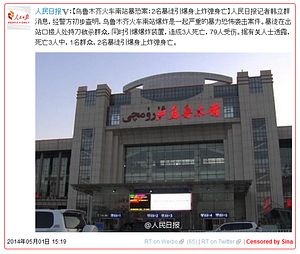According to Freedom House’s Freedom of the Press 2014 report, China is tied with Vietnam, Laos, and Azerbaijan for 183rd place in terms of press freedom. The last place country was North Korea at 197, with Sweden, Norway, and the Netherlands in a three-way tie for first place.
The report noted that China’s press freedom took a step backward in 2013, due to high-profile campaigns against online rumors, new requirements for journalists to undergo ideological training, and increased pressure on foreign journalists. As a result, the report said, “Chinese citizens’ ability to share and access uncensored information, particularly about breaking news, suffered a setback.” Despite these concerns, however, China’s overall press freedom score has been remarkably consistent over the past 10 years, never more than two points worse or better than this year’s score of 84 (possible scores range from 1-100, with 100 being the least free and 1 being the most free).
The recent bomb attack in Urumqi provided a poignant example of the way China’s censorship machine can quash breaking news. News of the explosion was initially reported by China’s official state news agency, Xinhua, as well as by the state-run paper People’s Daily. Both outlets quickly posted the news that an explosion had occurred at the Urumqi train station to their official microbogs. Xinhua also translated its report into English and uploaded the English-language report to its website.
Apparently, China’s censors retroactively decided to kill the story. The original microblog postings were deleted or censored, as were any mentions of the story that had been cross-posted by other websites, including Sina and Sohu. These articles would appear as search results in both Google and Baidu, China’s main search engine, but the links were, for the most part, dead. However, Xinhua’s English-language report remained active, leading to the strange situation of other Chinese-language news sites citing the English-language version of China’s state news agency to report on the story (and many of these posts were quickly deleted).
It’s typical for China’s internet censors to block internet posts or media stories containing alternative viewpoints on or speculation about sensitive events. For example, according to China Digital Times, Chinese media outlets have been instructed to “strictly adhere to Xinhua wire copy in coverage of the terrorist attack on the Urumqi train station.” The exhortation continued: “Do not modify headlines. Do not produce other reports or commentary.”
However, in the immediate aftermath of the bombing, even Xinhua itself was apparently not allowed to cover the case — despite having effectively broken the story on its microblog. Apparently the Urumqi bombing was considered so sensitive that all reporting was effectively banned until higher-ups had decided how best to cover the story. Yet the Chinese words for “Urumqi” and “train station explosion” were not blocked on Baidu, meaning internet users could search for and see the headline of since-deleted stories.
As the Freedom House report points out, this sort of total media blackout is fairly unusual in China when it comes to major breaking news events. Instead, official Chinese media outlets are typically allowed to report even on sensitive news in what Freedom House calls “a timely but selective manner.” In the case of the Urumqi bombing, China’s official state media began to cover the event immediately, but then stopped. Coverage was then deleted and/or blocked for the next four to five hours.
The curious case of the Urumqi bombing, where even official media apparently overstepped their bounds, reveals just how seriously the Chinese government takes censorship. It also helps make clear why online rumors are so popular in China. For several hours, all of China’s news sites were effectively silent about a major breaking story. In the absence of official Chinese-language reporting on the subject, netizens curious about the story would have to turn to unofficial sources for news, with no guarantee that these sources had accurate information.
Between 11:30 pm and 12:00 am Wednesday night (over four hours after the bombing), both Chinese and English-language versions of China’s major news outlets finally began covering the Urumqi bombings. On May 1, the headlines of Xinhua’s Chinese webpage were all devoted to the bombing, including a report of the details, President Xi Jinping’s response, and outrage over the bombing from Uyghur college students.
Yet even now, some bits of information are apparently taboo. The People’s Daily microblog tweeted out the latest news of the attack. The report was mostly in line with the official Xinhua copy — with the addition of an explicit reference to the two suspects as suicide bombers. This tweet was deleted by censors (although it remains visible on the site Free Weibo).
The coverage of the Urumqi bombing provides a concrete example of the issues presented by the Freedom House report. China’s tight media controls prevents journalists from doing their jobs, and prevent average citizens from having access to information, especially where breaking news is concerned.

































